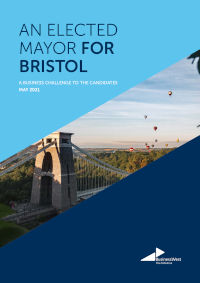
The mayoral model of governance, which sees Bristolians head to the polls every four years to elect the leader of their city, is under threat.
Two of the nine candidates standing in May’s election have mooted the idea of holding a referendum to reverse the decision taken by the city’s residents in 2012 to create the role of directly elected mayor. This could potentially see the role of mayor scrapped and a return to a cabinet or committee system of local governance.
It seems hard to believe that nearly a decade has passed since Bristol took the decision to adopt a mayoral system of local governance. During this time, compelling evidence regarding the benefits of a mayoral system for businesses and residents has emerged, which is why the stance taken by a minority of candidates is concerning.
Full disclosure - between 2010 and 2012 I led the ‘Elected Mayor for Bristol' referendum “Yes” campaign in the belief that a directly elected mayor would improve decision making in the city for the better.
Prior to 2012, good (council) leaders could be removed from office by their parties at any time. In Bristol, we had five changes of leadership in seven years. It wasn’t difficult to see how the lack of stability made it impossible for much needed long-term thinking and decision-making. We didn’t need better leaders - we needed a better governance model for our leaders to operate in, not just to deliver local government functions. Bristol deserved to be allowed to punch at its weight. I still believe our governance has changed for the better with the Democratically Elected Mayoral model.
That being said, I’ll be the first to admit that, like all systems, the mayoral system of local governance isn’t perfect.
For instance, research by our two local universities suggests that the role of councillors has been unnecessarily restricted as a result of the mayoral model of governance. The same research also suggests that directly elected mayors’ expansive remit risks overloading one individual.
Clearly there is an imbalance that needs to be addressed, and whoever is elected in May must make strengthening the role of councillors a top priority. Other cities have addressed this. So can we.
Nevertheless, findings from the Bristol Civic Leadership Project concludes that the pros of a directly elected mayor for the city massively outweigh the cons.
1. The mayoral model delivers far more visible leadership of the city
In 2012, before the mayoral model was introduced, 24% of Bristol citizens thought the city had visible leadership.
In 2018, this figure rose to 51% - more than double.
Improved visibility of city leadership makes for a much healthier local democracy, promoting greater awareness and engagement in local politics.
2. Direct election gives substantial democratic legitimacy and makes mayors more accountable
The process of direct election gives substantial democratic legitimacy to the post holder, and this enables them to speak out on behalf of the city (as they know the citizens of the city voted for them).
In 2012 over 37,000 people voted for George Ferguson and in 2016 over 68,000 people voted for Marvin Rees.
These numbers are far higher than the number of people voting for any MP in the UK.
And like MPs, if they don’t deliver on their promises, residents have the opportunity to vote them out at the next election.
3. Successive mayors have been effective in developing a forward-looking vision for the city
Both city mayors have been shown to be more successful than Council Leaders in projecting the reputation of their city on the national and the international stage.
In an increasingly competitive world, the importance of a strong leader with a clearly articulated vision cannot be underestimated.
4. 4-year terms provide stable leadership
The mayoral model has delivered stable leadership (as they hold their post for a 4-year term).
Before the mayoral model was introduced city leadership in Bristol was very unstable, with political infighting all too commonplace.
A 4-year term gives mayors the breathing space to take a longer-term view and focus on the day job without getting caught up in electioneering.
In the face of the legitimate concerns of candidates being raised as part of the election campaign, I’m not alone in wishing to highlight the importance of retaining the mayoral model of governance in Bristol.
Emeritus Professor of City Leadership at the University of the West of England Robin Hambleton and President of Bristol Chamber of Commerce Richard Bonner have both chosen to speak out and stress the benefits of a directly elected mayor for Bristol.
“The evidence from the Bristol Civic Leadership Project shows that the mayoral model of governance has, under successive mayors, served the city rather well. While the research shows that the model can be improved - for example, the role of councillors within the system should be strengthened - it lends no support to the view that the mayoral model of governance should be abolished.” says Professor Hambleton.
“The elected Mayor of Bristol is a key position within the city and provides a platform to develop joined up solutions to the complex problems that our communities face. Delivering sustainable and inclusive economic growth after COVID and de-carbonising how we live and work are just two of the most pressing issues where a mayor can make a real difference. An alternative model of local governance would hamper our city’s ability to rise to these challenges, effectively tackling them with one hand tied behind our backs.” says Richard Bonner.
The diversity of these voices gives added weight to the claim that the mayoral model has delivered significant improvements to the governance of our city.
But they also serve as a reminder of how lucky we are to have such a vibrant local democracy, so please remember to exercise your democratic right and vote on 6th May!
About the author
Jaya is Vice President of the Bristol Chamber of Commerce and Initiative at Business West. As CEO of award-winning tiscreport.org she is tackling corruption and modern slavery in supply chains. Jaya was named one of the top 100 Corporate Influencers in Modern Slavery 2018 & a top 100 Asian Star in Tech 2019.
- Log in to post comments

